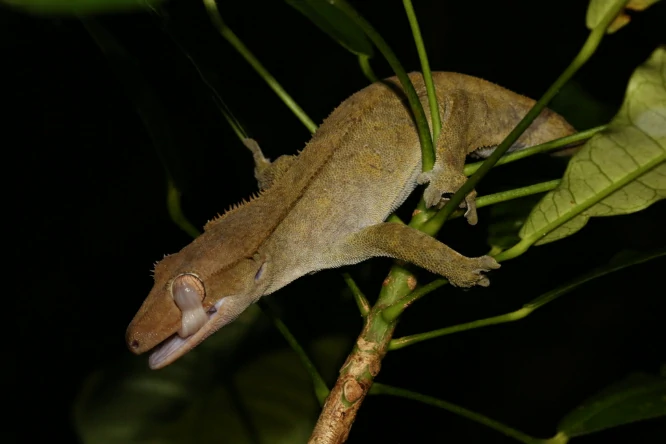You drop a few mealworms into your gecko’s bowl and watch it flick out that quick little tongue, swallowing each one like it’s the best snack ever. Then you pause and wonder, should you stop it, or will it stop on its own? Do geckos actually know when to stop eating?
Most geckos do know when to stop eating, but not always. In the wild, they usually stop once they’re full because food isn’t always around. But in captivity, with food available all the time, some geckos can overeat (especially leopard geckos and crested geckos). So while they can self-regulate, it’s not foolproof.
That “stop eating” instinct works in the wild because food is limited. In your tank, worms and crickets keep coming, even when your gecko’s belly is full.
Wild Geckos Don’t Eat All the Time
In the wild, geckos live on a schedule they can’t predict. One night they find a ton of bugs. The next, nothing. Their bodies are very sensitive to food when it shows up, and then they go without for a while.
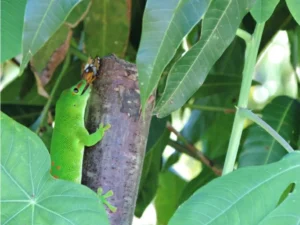
A wild gecko’s hunger instinct is basically built for survival. They eat what they need for energy and store fat (especially in their tails) so they can make it through when food is scarce.
If you watch a gecko hunt, it’s pretty cool. They stalk, strike, and then take a break after a few bugs. That break isn’t laziness, it’s their body saying, “Okay, I’m full for now.”
So yes, geckos have a system that helps them stop. But it’s made for the wild, not a constant buffet.
Geckos in Your Tank Sometimes Don’t Know When to Stop
In your tank, food is always easy to catch. It doesn’t run away or hide. That’s when problems start.
Some geckos, especially leopard geckos, will keep eating as long as food keeps coming. They’re not greedy, they’re just following their instincts. In the wild, eating too much wasn’t a problem. In your tank, it can be.
You might see your gecko begging for food and think it’s hungry again. But geckos can beg even if they aren’t hungry. They respond to movement, smell, or the habit of getting fed.
It’s like someone who grabs chips every time they walk past the snack shelf, even if they just ate.
So while geckos usually know when to stop, living in your tank can mess with that instinct.
How Geckos Know When They’re Full
Here’s the simple version: geckos don’t think about being full like we do. They don’t decide to stop eating because they feel heavy or bloated. It’s automatic, a mix of body signals and natural behavior.
Their stomach stretches as it fills, which tells the brain, “That’s enough.” But if feeding is too easy or too often, that natural system can get mixed up.
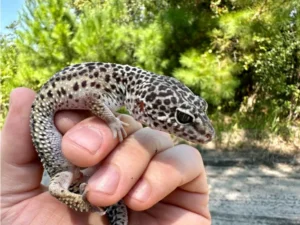
A healthy gecko’s tail is the best sign of fullness. When it eats, extra fat gets stored in the tail. A plump, rounded tail means your gecko has enough energy and doesn’t need more food right now.
But if the tail looks too thick or the belly gets chunky, that’s a warning your gecko might be overeating.
Signs Your Gecko Might Be Eating Too Much
If your gecko is overeating, you’ll probably notice small changes before they turn into big problems. Watch for these signs:
-
A very swollen belly that doesn’t shrink overnight
-
A tail that’s unusually thick or lumpy
-
Laziness or slow movement right after eating
-
Refusing food for a few days after a big meal (their stomach’s just too full)
-
Passing large or frequent droppings
Some leopard geckos also throw up food if they eat too much too quickly. That’s a sure sign they don’t know when to stop, or that you’re giving too much at once.
Basically, if your gecko looks like it’s wearing a tight belt instead of having a smooth belly, it’s time to cut back a little.
What Happens When a Gecko Eats Too Much?
Eating too much puts stress on a gecko’s body. Digestion slows, fat builds up in the liver, and over time they can get overweight or even develop fatty liver disease. This is a common problem in pet reptiles that eat too much.
Eating too many insects with hard shells (like mealworms or superworms) or accidentally eating the substrate can cause impaction.
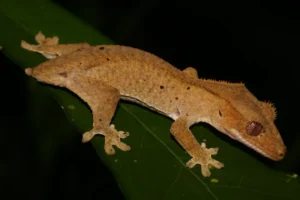
An impacted gecko may stop pooping, move less, or drag its belly low because it feels heavy and uncomfortable.
That’s why feeding the right amount really matters. It keeps your gecko active, helps it digest food properly, and avoids health problems later.
Different Geckos Handle Food Differently
Some gecko species are more likely to overeat than others.
For example:
-
Leopard geckos eat as much as they can because they’re made for deserts where food is scarce. In your tank, that instinct can backfire.
-
Crested geckos usually stop on their own, especially if they eat fruit-based foods like Pangea or Repashy.
-
Tokay geckos can overeat when young and growing fast, but usually settle down as adults.
-
Day geckos and house geckos are more moderate eaters. They don’t overeat as easily, though they’ll still eat extra if you keep offering.
So while most geckos know when to stop, some need your help to pace themselves.
How Often Should You Feed a Gecko
It depends on your gecko’s age, size, and species, but here’s a simple guide for most pet geckos:
-
Baby geckos (under 6 months): Every day. They’re growing fast and need energy.
-
Juveniles (6–12 months): Every other day or 4–5 times a week.
-
Adults: 2–3 times a week, depending on size and condition.
When you feed them, only give as much as they can eat in 10–15 minutes. That’s usually 5–10 insects for adults, fewer for smaller ones.
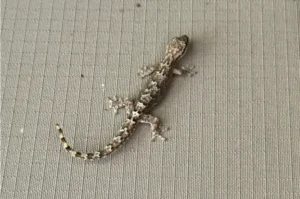
If you use pre-made diets like crested gecko food, follow the package. It’s usually balanced and safe to leave overnight.
Why Some Geckos Stop Eating
It’s funny, while some geckos eat too much, others suddenly stop for no clear reason. This can happen when they’re shedding, stressed, too cold, or during breeding season.
A gecko that’s shedding often stops eating for a few days. The same happens if the tank is too cold, because digestion slows when they can’t warm up properly.
Leopard geckos also eat less during winter when their internal rhythm slows (called brumation). It’s not sickness. it’s just nature.
But if your gecko stops eating for more than 10–14 days, check the basics: temperature, humidity, hiding spots, and any signs of illness.
Can Geckos Get Addicted to Certain Foods?
Yes, they can get picky or “addicted,” especially to mealworms or waxworms. Those worms are fatty and soft, and geckos often find them easier to eat than crickets or roaches.
The problem? Too many fatty worms can cause nutrient imbalance and obesity. Waxworms are like junk food for geckos; okay as an occasional treat, but not every day.
If your gecko refuses anything but worms, you can slowly retrain it. Mix worms with healthier feeders like dubia roaches, and reduce worms over time. Most geckos eventually switch back once they see the new bugs move just as nicely.
How to Help Your Gecko Eat the Right Amount
You can help your gecko stay balanced with a few simple steps:
-
Feed on a schedule instead of leaving food in the tank all day.
-
Keep portions small. Only what they can eat in 15 minutes.
-
Watch their tail and body for extra fat.
-
Offer variety: crickets, roaches, silkworms, and the occasional mealworm or waxworm as a treat.
-
Make sure the tank is warm. Geckos digest food better when warm.
Feeding time is also a chance to check your gecko’s eyes, tail, and skin. If something looks off (bloating, sluggishness, or strange poop) pause feeding and figure out what’s going on.
What About Geckos That Don’t Eat Enough
Some geckos stop eating when stressed or sick. Moving to a new tank, too much handling, or being in the wrong temperature zone can all stop them from eating.
A gecko that’s too cold can’t digest food properly, so it basically says, “Don’t bother eating.”
If your gecko isn’t eating and it’s not shedding or brumating, check:
-
Tank temperature (warm side around 88–92°F for leopard geckos)
-
Hiding spots (too exposed = stress)
-
Lighting (too bright or wrong cycle)
-
Parasites or illness signs (thin tail, watery poop, sluggishness)
Once the environment feels safe and warm again, most geckos go right back to eating normally.
Frequently Asked Questions
Do geckos eat only when they are hungry?
Mostly, yes. Geckos rely on instinct rather than a set schedule. They usually hunt or accept food when they feel hungry, and ignore it when they’re full or not in the mood.
How often do geckos naturally eat?
It depends on their age and species. Baby geckos can eat almost every day, while adults often eat every 2–3 days. Some larger species might even go longer between meals if their body is getting enough energy.
How can I tell if my gecko is full?
A gecko that’s full may slow down, hide, or ignore offered food. Their tails can also be a clue: well-fed geckos often have thick, plump tails because that’s where they store fat.
Do geckos refuse food when they are not hungry?
Yes, refusal is normal. Geckos sometimes ignore food if they’re stressed, shedding, or simply not hungry. It’s usually nothing to worry about as long as they resume eating regularly.
Do geckos ever binge eat?
Occasionally. Young geckos or very hungry geckos may eat more than usual in one sitting, especially if they haven’t eaten for a while. Adult geckos tend to pace themselves more.
What happens if a gecko eats too much?
Eating too much rarely causes serious harm, but it can make them sluggish or slightly bloated. Overfeeding long-term can lead to obesity or other health problems, so portion control is important.
Should I remove uneaten food from the tank?
Yes, always. Uneaten insects can stress the gecko, bite it, or contaminate the tank. Removing leftover food keeps the enclosure clean and safer for your gecko.
Conclusion
So, do geckos know when to stop eating? Yes, usually, but being in your tank changes the rules. In the wild, limited food keeps instincts balanced.
In your tank, endless worms can confuse them, and some geckos eat too much.
Your job is to help them stay in rhythm. Feed the right amount, keep things varied, and watch how your gecko looks and acts.
A healthy gecko will eat with excitement but not obsession, and it shows in that plump tail and curious little face watching you from its favorite rock.
When in doubt, remember this simple rule: geckos don’t need constant feeding, they need consistency and care.
Hi, my name is Ezra Mushala, i have been interested animals all my life. I am the main author and editor here at snakeinformer.com.

